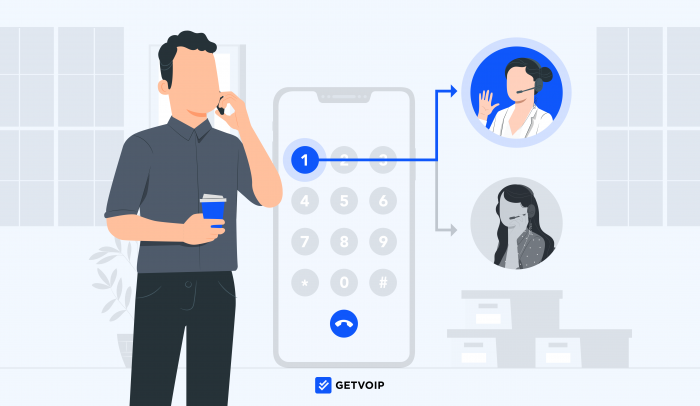Call center IVR (interactive voice response) can offer a myriad of benefits to any business. It allows you to take control of your call volume, which is a huge benefit when your business may not have the bandwidth to take on all these inbound calls on its own. Thanks to call center IVR, you can operate on the level of a larger organization without the expensive costs that come with a larger workforce.
In this article, we'll discuss how IVR can benefit your call center.
What is a Call Center IVR?
An IVR (interactive voice response) system acts as a virtual receptionist for your call center. It interacts with callers through interactive menus and gathers necessary data and caller intent. After processing that information, the IVR system sends the caller to the agent best suited for their needs.
IVR technology can be leveraged by businesses in any industry. As call centers are often flooded with a high volume of calls, they commonly utilize IVR tools. These tools offer features that can allow for better self-service options, enhance the customer experience, and increase the overall call center performance.
Features of a Call Center IVR
You can expect the following features in a call center IVR solution:
- Built-in automatic speech recognition (ASR) - This technology can identify and process words spoken by callers in real-time. The speech can even be translated into text to create a full transcript of the conversation.
- Queue callback - This gives your callers the option to have a representative call them back on the specified phone number when their place in line is reached.
- Skills-based routing - This feature enables your business to direct callers to the best call center agent for the inquiry.
- Intuitive script designer - An IVR system needs a script to work with in order to know how to interact with callers. This feature helps you to create that specific script.
- Ring groups - A ring group enables you to answer an incoming call on any telephony system within a specified group.
The true difference between these types of IVR systems is just how a business uses them. IVR tools are typically utilized to help agents better manage their call load and ensure customers have a solid self-service option. While other industries often use IVRs for the very same reason, they might also leverage them for other reasons. These might include saving money on operational costs, as an IVR can replace a human receptionist.
Use Cases for IVR in a Call Center
The following call features can be found in an omnichannel IVR system. Here’s how leveraging them will benefit your business.
- Skills-based routing - There are a number of different routing strategies that your team can take in order to best distribute call flows. However, skills-based routing is one of the most effective routes you can take, and an IVR system can provide you with that. It's a step up from an automatic call distributor (ACD) If you leverage this feature, you can route calls to the right agents based on certain specifications, such as specific languages, time of day, or an agent's level of experience. If the right agent isn't available, your caller will be sent to their voicemail.
- Personalized messages - With an IVR tool, your organization can create personalized recorded messages for incoming calls. United World Telecom states that customers feel more comfortable when they call a business and are subsequently greeted by personalized messaging. This will boost the overall customer experience for new and returning customers alike.
- Agent automation - IVR systems can automate certain tasks typically performed by agents, such as service activation, payment processing, troubleshooting services, and providing answers to frequently asked questions. Automating these tasks will allow your agents to be productive when it comes to more complex tasks. That means that your team's time and talents can be utilized more efficiently.
- Additional support options - Implementing an IVR system means you can offer your customers support around the clock. If your agents are occupied, IVR offers self-service options for customers to solve their own issues without the need for agent intervention. Customers are able to dial specific numbers on a keypad that will take them to complete tasks such as finding out what account balances are. If a customer calls in a time outside of business hours, an IVR system has the ability to forward that call to an agent in another office that is available to take the call.
- Assistance managing calls during high-traffic times - For a cloud contact center, a high influx of calls on a daily basis comes with the job. By combining all the available features your IVR system has to offer, you can easily manage those calls. Your IVR platform can take on some of the load, giving your agents room to breathe so they do not burn out.
Benefits of Using IVR in a Call Center
Using an IVR can offer your call center a number of benefits. Here are some you can expect from implementing this technology.
- Increase first contact resolution - Your call center has certain KPIs it tracks, and first contact resolution is likely among them. Using an IVR system in your daily software stack can help you improve your first call resolution. This is because calls will always be directed to the person who is most capable of meeting that caller's needs, thanks to skills-based routing. With the most qualified agent taking calls, those inquiries will likely be solved on the first call, without the need to be transferred.
- Boost your customer service offering - An IVR system can help to boost your customer service offering from a number of different angles. An IVR tool can help to increase your agent and company efficiency due to the vast feature set it offers. In turn, that will help to boost your customer service offering. Agents well-equipped with using an IVR to handle customer inquiries will be more proficient when it comes to solving problems and meeting the needs of specific customers. When you succeed in offering that, you will inevitably have happier customers.
- Bring down operational costs - Not only does an IVR help to make your team more efficient, but it can save you money in the long run as well. Since the platform answers and distributes incoming calls among your team, it can replace a live receptionist. Not to mention IVR platforms are affordable, meaning that the ROI on implementing one of them is absolutely worth it.
- Bandwidth to prioritize high-value customers - While all of your callers are important, it's a simple fact that some will always be higher-priority than others. Implementing an IVR system will allow you to give those callers the ample time that they deserve. That's thanks to an IVR system's ability to provide your callers with less complex issues with self-service options to solve their own problems.
- Improve call routing and transfer rates - IVR systems make the calling process far easier for your customers. For one, these platforms are specifically designed to route callers to the most appropriate agent. This optimized routing means that you can expect lower call abandon rates and your callers can expect less wait time.
- Increase the customer experience - An IVR system is designed to make the calling experience simple and hassle-free. Because of that, customer satisfaction with your company will automatically be improved. You can also leverage these systems to measure the current level of customer success, as you can run a customer experience survey like a CSAT survey. Simply put, happier customers are likely to stick around longer.
Call Center IVR Best Practices
An IVR system will be a huge benefit for your business, as long as you use it in the most efficient way. Here are some best practices for using this type of call center solution.
- Provide customers with a live agent option - The self-service option offered within IVR systems is one of the most beneficial features this software has to offer. However, you should still always make sure you offer your customers the option to speak with a live agent. Some issues simply cannot be solved through self-service portals. That way, your customers will always have assistance available to them.
- Only make call recording announcements during transfers - TTEC suggests you limit call recording announcements as much as possible. Customers do not need to be constantly reminded that their call is being recorded. You only need to trigger those announcements when it is necessary.
- Offer multiple languages - IVR systems are highly customizable, meaning that it is easy to tweak the platform to fit your customers' needs. The odds are that your customers don't all speak the same language. Because of that, it'd be wise to offer the option to hear IVR menu options in multiple languages early on in the calling experience. That way, your customers' needs will be met and they will be able to feel that your organization offers an inclusive customer experience.
- Main menu options shouldn’t exceed 30 seconds - You want to make sure your menu options are succinct and to the point. Making sure that you simplify your menu options will ensure that your customers have the best experience possible with your organization. If you give users too many options, they might get frustrated and hang up prematurely.
- IVR should sound like a human - Implementing an IVR system is meant to help enhance your customer experience. But if your system sounds robotic, it may be a jarring experience for callers. IVR designers can actually humanize these platforms by entering pre-recorded voice responses into the tool that even use correct tone and inflection. That way, your customers will feel like they are speaking to a real person.
- Use voice recognition and barge-in - Voice recognition allows for an IVR system to process the words customers speak to them. With this feature, your tool can take natural pauses in order to allow customers to enter information or respond to voice prompts. This will provide a seamless experience for your callers. But if your tool doesn't offer voice recognition or it has a limited capability, you need to make sure it provides barge-in. These features will allow for the smoothest conversation possible.
- Information shared with IVR should be passed along to a live agent - TTEC also states that a common frustration for customers is having to repeat information to various agents. So to avoid that, make sure all the information shared with an IVR is passed along during call transfers. That way, the agent taking over can jump into the conversation without missing a beat.
The Bottom Line: You Can't Go Wrong with an IVR
As a small business, your agents are likely stretched pretty thin. But that doesn't mean you should sacrifice the quality of the customer support you offer to your callers. An IVR system is worth the purchase since it can boost your customer service offering without costing you an arm and a leg or taking the time to train new human agents.



